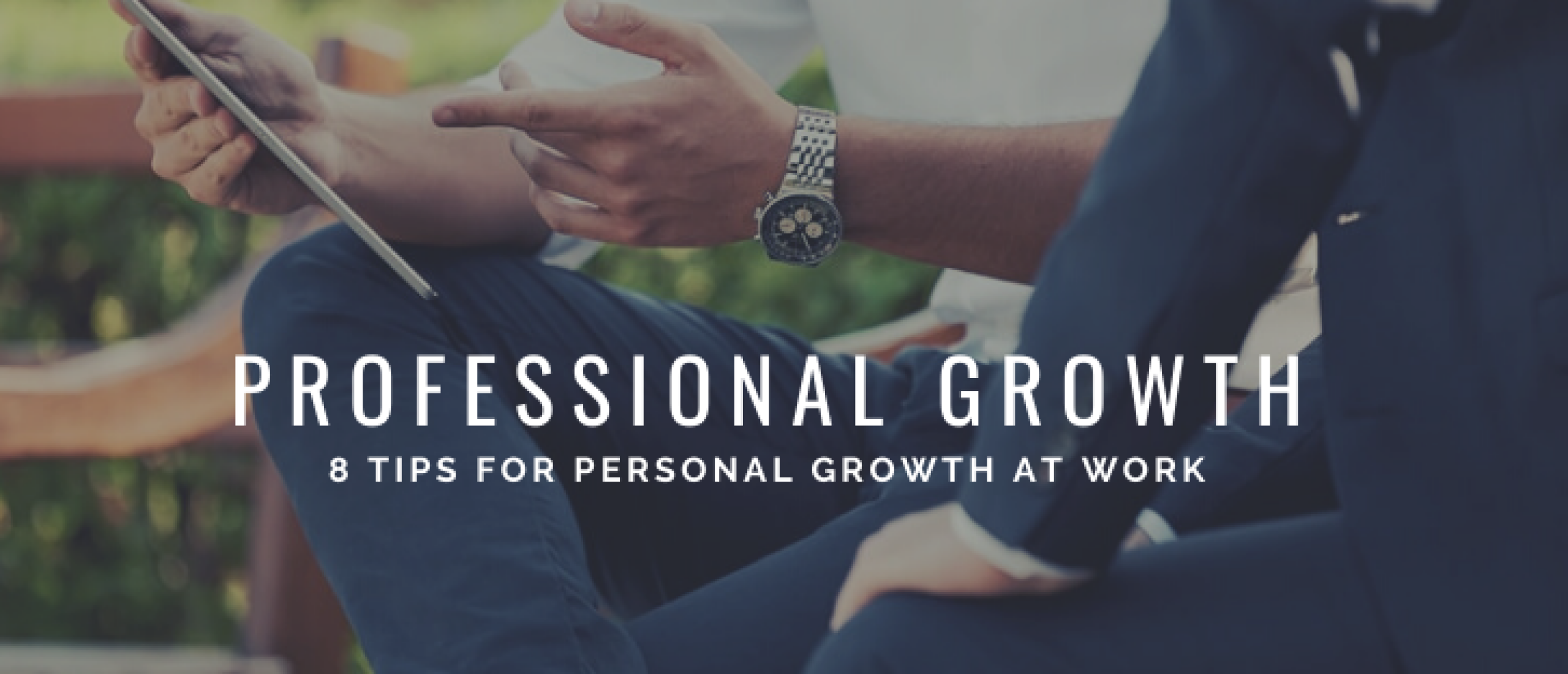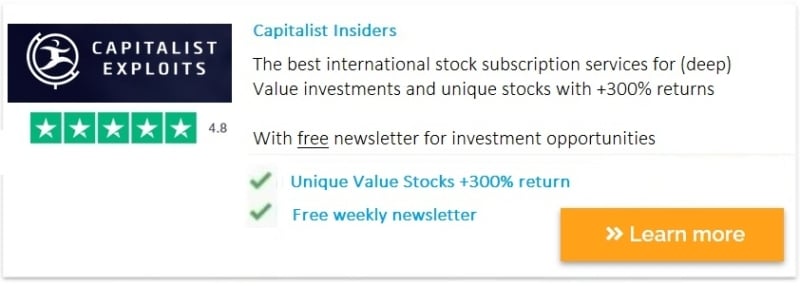Personal growth at work brings attractive benefits. And it's more than that. Professional development follows from a certain attitude. A way of thinking and doing. That's why pursuing and developing professional growth at work is also key to a finer life. Below we explain the how and why. Then we will give 8 tips for personal growth at work!
On to sustainable (financial) success!
What is personal growth at work?
Personal growth refers to the process of strengthening your character, skills, and talents. Setting these goals entails self-examination and identifying areas where you may improve to reach your full potential.
When we talk about personal growth at work, it means developing the skills and capabilities that will allow you to maximize your effectiveness and efficiency to achieve your professional goals.
Professional development comes with some evident and attractive benefits, such as higher salaries, more respect, and more interesting projects. It's no surprise, then, that many employees have the drive to excel in their jobs and advance up the corporate ladder.
However, personal growth at work is much more than that. It involves finding meaning in what you do and becoming a better person in every aspect. This improvement will positively impact your work hours and your level of satisfaction with what you do.
As a Happy Investor, we want to pursue personal growth at work. Not so much for the sake of more income, although this is useful so that we can invest in stocks and other assets. But mainly because it gives us pleasure and satisfaction. This drive often results in more enjoyable work, with more autonomy and impact. On the other hand, we do want to ensure that work does not become our life. We still strive for financial freedom, which means the right balance between meaningful work and pleasant life. For everyone, the balance is different. As long as work does not come at the expense of the things and persons that really matter in life.
How to stimulate personal growth at work (and life)? 8 Tips

Personal growth at work has many benefits. In fact, it is a certain attitude. A Mindset. This is something you can train. Grow it. With these 8 tips, you can encourage personal growth at work.
Tip 1. Find meaning in what you do
Most entrepreneurs want to find a purpose in what they do, not only maximize their profits. Purpose refers to the desire to do things in service of something larger than ourselves. In other words, doing things that matter.
When you find meaning in your work, this drive motivates you to become a better person and do things right. So, ask yourself what motivates you, what gets you up in the morning, and what keeps you moving forward.
Most of the time, this purpose has to do with helping others, making a difference, or contributing to society. This meaning is the first impetus for personal growth at work
Tip 2. Have a clear vision
Personal growth (at work) begins with a clear vision. Create a strategy with concrete actions to get started with professional growth. These steps will help you track your progress and stay on track to meet your goals.
What do you want to achieve with your work? Where do you want to get to?
Set SMART goals.
The SMART in SMART goals stands for Specific, Measurable, Achievable, Relevant, and Time-Bound. When you set SMART goals, it is easier to track your progress and meet those goals.
Tip 3. Build meaningful relationships
“If you want to change the world, start with yourself.” – Mahatma Gandhi
Building professional relationships can make your job more fulfilling. Having a large and diverse network of people can be an invaluable resource for advancing your career or overcoming potential roadblocks.
Learn to listen, show kindness, and be a team player. These are key competences for meaningful relationships at work.
Tip 4. Step out of your comfort zone
In his book, The 7 Habits of Highly Effective People, Stephen Covey discusses how to cope with different situations by being proactive.
Covey designed an ingenious method called the Circle of Influence and Control, in which he included the following rings:
- The Circle of Concern
- The Circle of Control
- The Circle of Influence
The Circle of Concern encompasses all of your professional and personal difficulties and worries.
The Circle of Control includes the things you can directly control.
The Circle of Influence includes the things you can indirectly control.
The goal is to figure out when circumstances are inside your circle of control and which are outside. Generally, reactive people worry about the things they cannot control. Instead, proactive people focus on what’s inside their circle of control.
Proactivity means thinking about solutions instead of problems. This way, they can create change in their lives and even change events within their circle of influence. This way, they can also expand these two circles.
Being proactive sometimes means getting out of your comfort zone, but that means you take charge of your life and the situations you encounter. For that reason, being proactive is an essential personal growth skill at work.
Tip 5. Develop a growth mindset

A growth mindset is a way of looking at challenges. Having a growth mindset means believing that your abilities or talents aren't fixed, even when you struggle with specific tasks. People with growth mindsets believe that they can improve their abilities with time if they persevere.
On the other hand, people with a fixed mindset believe that their skills are what they are and will not change. They think that no matter how hard they strive; their skills will not improve.
People with a fixed mindset will say: "I can't, I'm not good at this," "I'm a failure," or "There is no point in trying If I'm going to fail."
Do some of these phrases sound familiar to you?
Having a growth mindset is so important when it comes to personal growth at work because we may encounter many situations that are new to us or we need to develop specific skills. If we believe we can't improve, we won't improve. This stagnates our professional development.
Don't be afraid to try new things. Practice makes perfect.
Tip 6. Keep learning
If you want to become better at what you do, you need to keep learning. Education is the best investment one can make. And why not? You were born to win. Believe in yourself. You can achieve anything you want.
Education is certainly not limited to that. There are thousands of knowledge books on personal development. You can go to courses, seminars or workshops that appeal to you. You can also learn from listening to podcasts or interviews with experts.
For most of us, learning by doing is the best form of learning. You can learn by paying attention to what colleagues are doing. Observe what makes them good at what they do and try to imitate that. Then ask them for feedback. Find a mentor who is 10 years ahead of you, and meet regularly for a coaching session. In doing so, apply a feedback loop. This means: applying feedback on the same day and learning from it.
Tip 7. Improve your emotional intelligence
In the workplace, your ability to recognize and control emotions is a valuable advantage. Emotional intelligence is the ability to identify and manage your emotions and other people's emotions. It allows you to understand other people's motivations and behavior patterns.
Emotional intelligence is great for boosting collaborative endeavors in the workplace. It will also allow you to improve express yourself and respond to the needs of your client and coworker relationships.
Observing your behavior patterns and reactions to interactions with others is the most effective way to improve your emotional intelligence. Keep an eye out for what upsets, inspires, or stresses you.
Emotional intelligence in the workplace begins with looking inward. It means identifying different parts of your feelings and emotions and devoting time to developing self-awareness, self-regulation, motivation, empathy, and social skills.
Tip 8. Find ways to relax and avoid burnout
Professional growth at work also includes emotional, spiritual, and mental growth. We all need to take care of our mental, physical, and emotional health. It’s also essential for productivity and growth at work.
Overworking can lower productivity because it causes additional stress. It can also lead to burnout. Clearly, this is not the right balance like what we talked about above.
Relaxation is essential for good health, work-life balance, and productivity.
Working less can sometimes boost productivity since it gives you more time to take care of yourself by sleeping, eating, and exercising appropriately. Finding time to rest is an undervalued way to increase your productivity because it allows you to recover and recharge. It boosts your creativity.
Rest does not only mean taking a nap. It also means taking some time to do something different and getting out of the routine. Do something that inspires you and motivates you. For example, you can visit nature, play sports, paint, read, hike, cook, take care of your garden, and so many other things.









